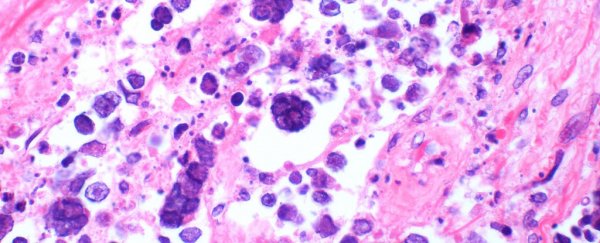The US Food and Drug Administration (FDA) has approved what it's calling a "first of its kind" treatment to help combat skin cancer: herpes.
Talimogene laherparepvec, which will be sold under the brand name Imlygic, was approved by the FDA this week for the treatment of melanoma lesions in the skin and lymph nodes. Imlygic is a genetically modified form of the herpes simplex virus that can result in oral and genital herpes. In drug form, it's administered via a series of injections to the site of the lesions.
While the ongoing stigma attached to herpes means the FDA's approval might raise a few eyebrows, using a modified form of the virus to help fight cancer in situations where surgery isn't an option is a scientifically solid alternative.
The modified virus is designed to replicate within tumours and cause lysis (cell death), rupturing them and releasing antigens that may promote an anti-tumour response, although the exact mechanism that helps the medication fight cancer cells is not yet fully understood.
In a study with 436 participants with metastatic melanoma that could not be surgically removed, 16.3 percent of participants who received Imlygic experienced a decrease in the size of the lesions on their skin and lymph nodes during the course of treatment (six months), whereas a group receiving a comparator therapy only saw a 2.1 percent decrease.
It's worth noting that Imlygic at this stage hasn't been shown to improve overall melanoma survival rates – although it's possible that it does – as the nature of the testing so far has been limited to tracking lesion sizes. The drug doesn't appear to have any effect on cancer that has spread further into the body, such as to the brain, bone, liver, lungs, or other internal organs.
But given that skin cancer is the most common form of cancer in the US and the leading cause of skin cancer-related deaths in the country, any new treatment is to be welcomed, even if patients might have to deal with side effects such as fatigue, chills, fever, nausea, flu-like symptoms, and maybe even herpes itself. Because of this, the FDA says the treatment should not be offered to pregnant women or patients with suppressed immune systems.
Another factor that may limit Imlygic's availability is cost. Amgen, the company that manufactures the drug, expects the average cost of Imlygic therapy per patient to be approximately US$65,000.
"Not all melanoma patients currently benefit from available therapies, and Imlygic represents an important new option that can provide meaningful durable responses for patients with this aggressive and complex disease," Sean E. Harper, executive vice president of research and development at Amgen, said in a press release.
